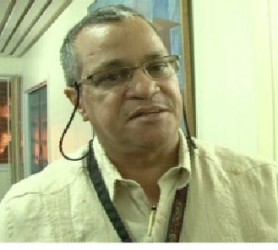Today, government and the developer, Sithe Global will hold a forum on the Amaila Falls Hydro Project as critics continue to blast the scheme as one that will be a burden to the economy with dangerous debt levels.
The forum, the second in less than a week, will be held at the Guyana International Conference Centre from 15:00 hours as Government seeks to persuade the Opposition and other stakeholders that the project is as viable as it is necessary. No-votes by the opposition to two Amaila measures earlier this month has jeopardised the project, the government has argued.

In the latest salvo against the project, noted economist, Professor Clive Thomas said Amaila should be scrapped and the sums outlaid hitherto foregone since it will be burdensome on the future generations of the country. At a Working People’s Alliance (WPA) press conference on Monday, Dr. Thomas said that Government in pushing the Amaila project will be creating debt that will almost rival the size of the national economy. He called the project ill-informed and badly conceptualized and charged that it was being pushed by uninformed politicians and the lackeys who stand to benefit from the project directly.
Former Auditor General and now President of Transparency International Guyana, Anand Goolsarran in an article in Monday’s edition of Stabroek News bemoaned that all of the interest for the financing from the China Development Bank and the Inter-American Development Bank will have to be borne by the final consumer of the electricity.
He questioned why it was that the Government of Guyana did not opt for more equity in the project.
However key private sector figures are lukewarm over the reservations about the Amaila Falls Hydro project and its effect on the economy of the country and believe the project remains a sound one for Guyana’s development.
Speaking to Stabroek News yesterday, Clinton Urling, President of the Georgetown Chamber of Commerce and Industry (GCCI) said that the body has received numerous presentations on the project from the government “and we are convinced of the soundness of the project.”

“We have no expertise from within our organisation to carry out a research or assessment of the project so we rely on the government and other studies that have been done towards this,” said Urling. “It is the Chamber’s belief that given the current political stalemate and standoff on this critical project, we suggest that the government and opposition agree to an independent evaluation from a reputable regional or international firm,” he said. Urling noted that such an approach would satisfy both sides of the political spectrum and “also the people of Guyana and allow for the project to proceed with amendments if necessary.”
Past Chairman of the Private Sector Commission and prominent businessman in the hospitality and aviation sectors Gerry Gouveia wrote off the commentators as prophets of doom.
He said that Guyana needs people to be positive about the project and not to come up with every possible negative scenario.
“When I was developing Roraima (Airways) a lot of what I was doing was based on my belief of success,” he said. “People would try to predict every bad thing. If you choose to look at all the negatives you will not be successful,” he said. “You have to believe that Guyana will grow and the economy will grow,” he said.
Gouveia rejected the comparisons of the Guyana project with hydro schemes in other parts of the world and said that larger hydro projects will always be less expensive comparatively to construct because of economies of scale.
Gouveia said that it was unrealistic and unjust to include the cumulative cost of the financing over the duration of the project and refer to the total as the cost of the project. He said too that if someone buys a vehicle through the commercial banking system, one does not consider the entire sum that will be paid over the life of the loan as the cost of the vehicle.
He said that through positive thought there is creativity and this will see this and the other transformational projects through. “All of the transformational projects are being criticized – the Marriott, the airport expansion and now Amaila. These projects would inspire investor confidence in Guyana,” he said.
Referring to the articles, Gouveia said that criticism of the state-owned Guyana Power and Light’s ability to manage the hydropower is unfounded. He said that persons must acknowledge the strides that GPL has made over the years but said that there could be improvements.
“I believe in the future of Guyana and we need positive thinking on these projects,” said Gouveia.
Meanwhile, Government on Monday came out swinging against comparisons of the Amaila project with one in Pakistan. “In reality, the Pakistani project, called the Patrind Hydropower Project, could not be more different than Amaila. The result is yet another example of the Opposition trying to use apples- to-oranges comparisons to purposefully mislead the Guyanese people,” said a release from the government.
Government pointed out that the cost of a transmission line is not included in the Pakistan project cost. “For Amaila, this cost is approximately US$155 million. The cost of an access road is not included in the Pakistan project cost. This cost is estimated at approximately US$30 million for Amaila,” the release said.
“The Pakistan project’s cost is actually estimated at US$436 million and not US$362 million as presented by the Opposition members. The project is ‘low tech’ when compared to Amaila. The Pakistani project uses simpler technology called run-of-river because of its natural conditions. A run-of-river hydro project is cheaper to construct than a normal hydro because it does not require the significant civil- engineering works such as the construction of an underground tunnel, which is a sizable portion of construction cost,” said the release.
It explained that Amaila will have a three-kilometre underground tunnel from the reservoir to the turbines, whereas the physical conditions of the Pakistan project does not require such a tunnel.
It noted that because the Pakistan project is a run-of-river project, it has small reservoir-56 hectares as against Amaila’s reservoir of 2,330 hectares. “That clearly shows the complete difference in hydro-dam type of the two projects and why they should not be compared, the statement said.
It said too that the Pakistan project benefits from concessional financing and that the Amaila project is longer lasting, hence more expensive. “The power generating equipment of the Pakistan project is expected to last for 30 years. Amaila’s equipment on the other hand is expected to last 50 years, and if well maintained with proper major maintenance overhauls, 75 to 100 years. Obviously longer lasting equipment will command a premium,” said the release.
“Aside from taking into consideration the facts specific to the two projects, the Opposition members failed to, purposefully or not, reveal to their audience the large difference in the settings in which these two projects are being developed.
Pakistan currently has 21 hydropower plants that are providing energy to its national grid. As a result, Pakistan has extensive experience in building and operating hydro projects, giving that country certain advantages, such as in- country expertise, on-going relationships with hydro developers, etc. In 2011, Pakistan had a total hydro installed capacity of 6,720 MW.” The release said. “Guyana on the other hand is in the process of developing its first hydro. This is the first time Guyana is able to tap its large water resource to deliver power to its citizens. However, the Opposition seems to be pulling out all stops to try to prevent this, even if it means distorting the facts and telling the public that they should continue to wait for hydropower by presenting false comparisons,” it said.
Meanwhile, Minister of Finance Dr. Ashni Singh accused the Opposition of exposing “opportunistically” confidential documents released by the investors of the hydro project. “These documents remain private and confidential as they are the property of a private company which has chosen to work with the [Government] and the joint Opposition to see this project to fruition. Such actions will result in major international investors being more cautious in the future about sharing sensitive information with the [Government] for fear that it can be made public at any time during negotiations. If investors cannot trust the leaders of a nation to respect the confidentiality of sensitive information, how can they gain confidence in investing in Guyana?” he asked in a statement to the media.




